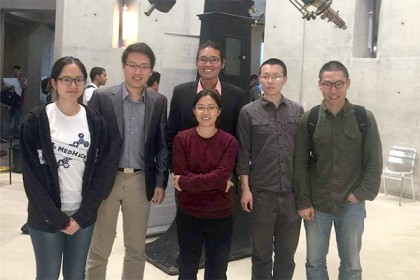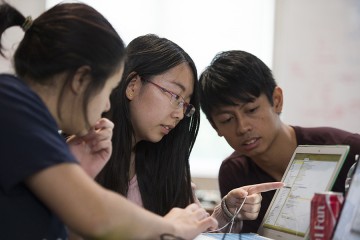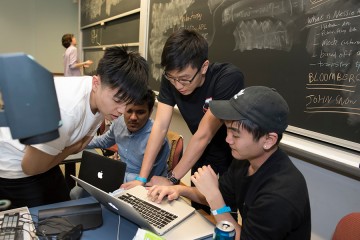About 500 students and entrepreneurs will be hacking through the weekend at Johns Hopkins, brainstorming new med-tech innovations for the third annual MedHacks event.
Participants from a variety of locales and institutions will cluster into teams for the 36-hour marathon of writing code, creating apps, and building prototypes for new medical devices. This year they're vying for an expanded array for prizes that includes mentoring from three MedHacks sponsors.

Image caption: The team from Cubix Health Technologies got their start at MedHacks, and now have developed new 3-D software for lung cancer screening
Also new this year is the location, which shifts from the university's Homewood campus to the Turner Auditorium at Johns Hopkins' East Baltimore campus to accommodate a larger group than in previous years, according to MedHacks outreach director Sabin Karki.
The student-run hackathon kicks off Friday evening with keynote speeches from Benjamin Jealous, former NAACP president and now venture capitalist and Maryland gubernatorial candidate; along with Peter Pronovost, founder and director of the Armstrong Institute for Patient Safety and Quality at Johns Hopkins.
MedHacks—modeled after HopHacks, a student-led hackathon that debuted at Hopkins in 2013—tasks teams with coming up with technological solutions for pressing health challenges. Participants "learn together, design together, eat together, and code together," the event description says.
The busy weekend will also include Saturday workshops on coding, app development, and startup growth, including one from Johns Hopkins Tech Ventures introducing its new FastForward U services for student entrepreneurs. An Apple-style "genius bar" will offer mentors on hand, and the hackers will have access to technology that includes virtual reality gear, Amazon Echoes, and Arduino 101 maker boards.
Karki, a JHU biomedical engineering student, said about half of the 2017 participants are affiliated with Johns Hopkins. Others hail from a range of institutions&mdah;including MIT, the University of Waterloo, and the University of California, Berkeley&mdah;and geographic locations as far as Iceland. He said the competition drew more than 3,000 applications this year.
MedHacks offers cash prizes of $1,500, $1,250, and $1,000 for the three winning teams, which will be determined by a panel of judges. The event also incorporates targeted themes from three event sponsors:
- Blue Cross/Blue Shield is looking for projects that improve access to health care
- CVS Health wants ideas for keeping patients up to date on filling prescriptions
- The Armstrong Institute is focused on improving quality and safety for patients
Winners within these targeted "tracks" will receive mentorship or training from the three sponsors, but the themes are intended as loose guidelines for inspiration, according to Karki, who said the competition is otherwise "open-ended."
Last year's MedHacks winners designed a product to send real-time GPS location data to emergency responders, while the second-place team developed a wearable app to track mental health status. MedHacks has also served as a launchpad for now-thriving startups, such as Cubix Health Technologies, which has developed new 3-D software for lung cancer screening.
This year's panel of judges includes three from Johns Hopkins:
- Patricia Davidson, dean of the School of Nursing
- Anthony So, director of the IDEA initiative
- Landon King, executive vice dean of the School of Medicine
Posted in Health, Science+Technology, Student Life
Tagged biomedical engineering, hackathon









